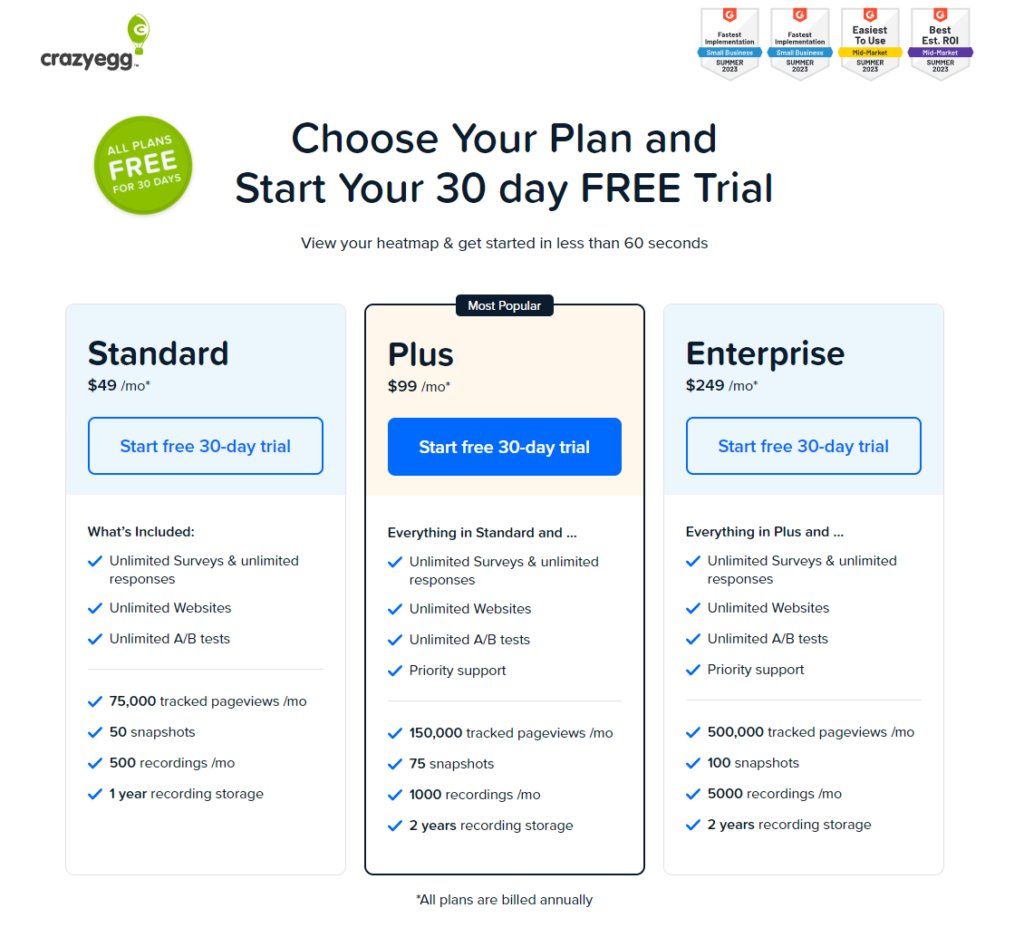In the ever-evolving landscape of digital marketing, choosing the right analytics tool is akin to selecting the perfect pair of glasses. The clearer your vision, the better your decisions. Today, we’re placing Crazy Egg and Optimizely under the microscope to determine which tool best sharpens your site’s focus. Both platforms offer powerful insights, but they cater to slightly different needs and preferences. Whether you’re a small business owner fine-tuning your website, a marketer aiming to enhance user experience, or a product manager looking to increase conversions, understanding the nuances between Crazy Egg and Optimizely can illuminate the path to your goals.
Crazy Egg | Optimizely |
|---|---|
| G2 Score – 4.2 out of 5 stars | G2 Score – 4.5 out of 5 stars |
| TrustRadius Score – 7.6/10 | TrustRadius Score – 8.7/10 |
User Interface and Ease of Use
In the digital realm, where time is of the essence, and user attention spans are fleeting, the accessibility and navigability of an analytics tool’s interface can make or break your workflow. Let’s see how Crazy Egg and Optimizely stack up in providing an intuitive, user-friendly experience.
Crazy Egg:
Imagine walking into a room where everything is exactly where you expect it to be. That’s the experience Crazy Egg strives to provide. Renowned for its straightforward, intuitive dashboard, Crazy Egg demystifies data analysis, making it accessible even to those with the most basic understanding of website analytics. With a few clicks, you can generate heatmaps, scroll maps, and other visual reports that offer immediate insights into how users are interacting with your website. These visual tools are not just powerful; they’re also incredibly user-friendly, making Crazy Egg an excellent choice for teams looking for quick, actionable insights without a steep learning curve.
Optimizely:
Stepping into Optimizely’s world is like entering a well-equipped lab. It’s designed for experimentation, offering a suite of tools for A/B testing, multivariate testing, and personalization. While Optimizely provides a comprehensive set of features for data-driven decision-making, its interface can be more complex due to the sheer breadth of options available. This complexity is not without purpose; it reflects Optimizely’s deep commitment to providing a flexible, robust platform for optimizing every aspect of the user experience. However, newcomers to the platform or those with limited technical expertise may find there’s a learning curve to effectively navigate and utilize its full range of capabilities.
Experimentation and A/B Testing Capabilities
The digital marketplace is a laboratory of sorts, where every tweak and change can have significant impacts on user behavior and business outcomes. Effective experimentation and A/B testing tools are essential for any business serious about optimizing their online presence. Let’s see how Crazy Egg and Optimizely empower users to conduct experiments and make data-backed decisions.
Crazy Egg:
While primarily celebrated for its heatmap and user behavior tracking capabilities, Crazy Egg has ventured into the realm of A/B testing with its “Editor” feature. This allows users to make changes directly to their site through Crazy Egg’s interface to test how different versions perform. However, it’s important to note that Crazy Egg’s strength predominantly lies in providing insights into how users interact with your current site design rather than extensive experimentation capabilities. The platform is excellent for identifying areas of your website that could benefit from optimization but is more limited when it comes to running complex A/B tests or multivariate experiments.
Optimizely:
Optimizely stands as a titan in the experimentation landscape. Its platform is designed from the ground up to facilitate A/B testing, multivariate testing, and even more complex experiments across websites, mobile apps, and even connected devices. Optimizely’s experimentation tools are robust, offering a wide range of features that allow businesses to test virtually any aspect of their user experience, from button colors to entire page layouts. Furthermore, Optimizely’s advanced targeting and segmentation capabilities ensure that tests can be finely tuned to specific audiences, providing deeper insights into what works best for different segments of your user base.
When it comes to experimentation and A/B testing capabilities, Optimizely clearly takes the lead with its comprehensive, feature-rich platform designed for rigorous, data-driven optimization. Its suite of tools is ideal for businesses that prioritize ongoing testing and have the resources to invest in a sophisticated experimentation platform.

Related: Check out our free SEO suite

Integration Capabilities
The synergy between various digital marketing and analytics tools can unlock new levels of efficiency and insights. Whether it’s your CRM, email marketing platform, or e-commerce system, the smoother the integration, the more cohesive and powerful your marketing strategy can be.
Crazy Egg:
Known for its straightforward and user-friendly approach to website analytics, Crazy Egg also offers integration capabilities, though they tend to be more focused. The platform allows for easy embedding of its tracking code across sites and is compatible with popular website platforms like WordPress, Shopify, and Squarespace. This ensures that businesses using these platforms can quickly set up Crazy Egg and start gathering valuable user behavior insights with minimal hassle.
While Crazy Egg integrates well with website builders and content management systems, its direct integrations with broader marketing ecosystems or advanced CRM platforms are more limited. For businesses primarily focused on enhancing their website’s user experience through direct, visual insights, this level of integration may suffice. However, for organizations looking for deep integration across a wide array of marketing and sales tools, Crazy Egg’s capabilities might seem somewhat constrained.
Optimizely:
As a platform built around the concept of experimentation and optimization, Optimizely excels in its integration capabilities with a wide range of other tools. From analytics platforms like Google Analytics to CRM systems such as Salesforce, Optimizely is designed to fit seamlessly into your existing digital ecosystem. This enables businesses to not only conduct extensive A/B testing and experiments but also to analyze the results within the context of their broader marketing and sales data.
Optimizely’s commitment to integration extends to content management systems, e-commerce platforms, and even custom-built applications, thanks to its robust API and developer tools. This level of integration capability makes Optimizely an attractive option for enterprises and organizations with complex digital infrastructures, seeking to embed experimentation deeply into their product development and marketing processes.
Customer Support and Educational Resources
The digital landscape is always evolving, presenting new challenges and opportunities. The quality of customer support and the availability of educational resources can be the deciding factor in how effectively you can navigate these changes and leverage your analytics tool to its fullest potential.
Crazy Egg:
Crazy Egg offers a focused approach to customer support, aiming to make its platform as intuitive as possible so users can self-navigate through most challenges. However, when assistance is needed, Crazy Egg provides support primarily through email, with detailed responses aimed at resolving user queries comprehensively. While this can be highly effective, the response time may vary, and there’s no instant support option like live chat for immediate needs.
On the educational front, Crazy Egg has developed a wealth of articles, guides, and tutorials available on its website. These resources cover a range of topics from basic setup and understanding heatmaps to more advanced user behavior analysis techniques. While the materials are well-crafted and informative, the platform might not offer the same breadth of educational content or community engagement opportunities as more extensive platforms do.
Optimizely:
Optimizely excels in providing a layered support system to its users. This includes email and chat support, as well as phone support for more urgent or complex issues, especially for customers on higher-tier plans. The immediate access to support across multiple channels ensures that businesses can quickly address any hurdles in their experimentation or optimization efforts.
Moreover, Optimizely is renowned for its comprehensive educational resources, including Optimizely Academy, which offers a range of courses and certifications designed to elevate users’ understanding of A/B testing, multivariate testing, and general optimization strategies. These resources are complemented by a vibrant community forum where users can exchange ideas, share challenges and solutions, and learn from each other’s experiences. Optimizely also regularly hosts webinars and events, further enriching the learning environment for its users.
Pricing and Value Proposition
In the competitive landscape of digital analytics and optimization, the pricing structure of a tool not only affects its accessibility but also reflects its intended audience and core value proposition. Let’s examine the pricing strategies of Crazy Egg and Optimizely and what they indicate about the tools’ overall value to businesses.
Crazy Egg:

Crazy Egg is known for its straightforward pricing model, which is publicly available on its website. This transparency is part of its appeal, making it easy for potential users to understand what they’re getting and at what cost. Crazy Egg offers several pricing tiers, starting from a basic plan that caters to smaller websites with limited traffic, up to more advanced plans that suit larger sites with more substantial data needs. Each tier increases in price based on the number of page views tracked and the availability of additional features, such as more extensive historical data and additional active pages for tracking.
This tiered pricing model makes Crazy Egg accessible to a wide range of businesses, from small startups to larger enterprises, allowing them to choose a plan that matches their current analytics needs while providing the option to scale as those needs grow. The value proposition of Crazy Egg lies in its ability to offer powerful, user-friendly analytics and optimization tools at a price point that is manageable for businesses at various stages of growth.
Optimizely:

Optimizely takes a different approach to pricing. Traditionally, Optimizely has catered to enterprise-level clients with its robust suite of optimization tools, and its pricing structure reflects this focus. Detailed pricing information is not publicly listed; instead, Optimizely provides customized pricing based on the specific needs and scale of each business. This bespoke pricing approach allows Optimizely to tailor its offerings to the complex requirements of large organizations, but it can also create a barrier for smaller businesses or those just starting with optimization who may find the cost prohibitive or the process of obtaining a quote too cumbersome.
Optimizely’s value proposition centers around its comprehensive suite of advanced experimentation and optimization tools, designed to deliver significant ROI for businesses that are heavily invested in data-driven decision-making. The platform is aimed at users who require a high degree of customization, extensive integration capabilities, and sophisticated experimentation strategies.
Conclusion
Choosing between Crazy Egg and Optimizely boils down to understanding your specific needs, budget, and the scale at which you’re looking to optimize your digital presence.
Crazy Egg offers an accessible, user-friendly platform ideal for small to medium-sized businesses or those at the beginning stages of diving into website optimization. With its visual analytics tools like heatmaps and session recordings, Crazy Egg provides clear, actionable insights that can help improve your website’s user experience without a steep learning curve. Its straightforward pricing model makes it easy to choose a plan that fits your budget, allowing for scalability as your business grows.
Optimizely, on the other hand, caters to a more advanced audience, offering a comprehensive suite of optimization tools designed for large enterprises or businesses with complex, data-driven optimization needs. With its focus on experimentation and A/B testing, Optimizely is well-suited for organizations looking to conduct in-depth analyses and tailored optimizations across their digital products. While pricing details are customized and may be higher, the value it offers in terms of customization, integration, and advanced testing capabilities is significant for those willing to invest in a top-tier optimization platform.
Read Next:
- GetResponse vs Zoho Campaigns: The Best Email Marketing Tool for 2024
- AWeber vs ActiveCampaign: The Best Email Marketing Tool
- Constant Contact vs Campaigner: Best Email Marketing Tool
- GetResponse vs Omnisend: The Best Email Marketing Tool for 2024
- AWeber vs Benchmark Email: The Best Email Marketing Tool






















Comments are closed.